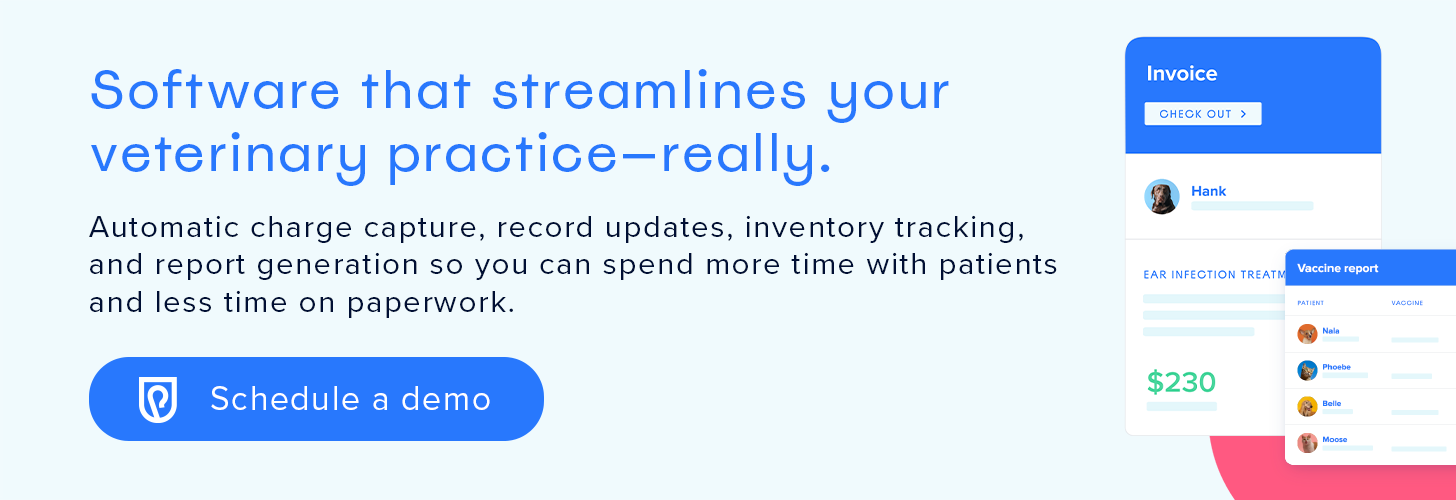5 Ways to Make Your Veterinary Practice More Eco-Friendly

Earth Day reminds us to look at our carbon footprint. This year, Earth Day will be celebrated on April 22; but everyone should embrace this important holiday year-round. We have only one planet, and we need to take better care of it to ensure future generations can live and thrive in the same wonderful green spaces we do today.
Although there never seems to be enough time to sort through plastics and tote your haul to the nearest recycling center, recycling your veterinary practice’s waste is one of many ways you can promote a more eco-friendly practice. Consider incorporating the following five methods into your daily operations to create a more sustainable veterinary practice.
#1: Reduce disposable materials usage
Have you stopped and considered how many single-use items your practice burns through every day? While you cannot reuse many of your supplies for health and safety reasons, some can be swapped out for reusable products. This will likely save money in the long run, and it’s more eco-friendly than adding mounds of plastic to landfills.
Try the following changes to help preserve the environment:
- Use reusable cloth surgical caps instead of wear-and-toss ones.
- Swap out paper shoe covers for shoes worn only in the surgery suite.
- Switch from paper towels to cloth hand towels that can be sterilized for surgery scrub-in.
- Use surgical items, such as drapes and gowns that can be re-sterilized multiple times.
- Switch from disposable to reusable sterilization wraps for surgical packs.
- Use recyclable sterilization pouches for surgical instruments and supplies rather than disposable options.
Look for disposable, one-use supplies to swap with reusable products that can be re-sterilized.
#2: Put water-saving measures in place
In addition to plastic supplies, veterinary practices can use vast amounts of water for specific tasks or personal use, often much more than needed. You can preserve water in your practice by:
- Using an alcohol-based surgical skin preparation instead of the typical surgical scrub
- Installing low-flow toilets in your employee and public restrooms
- Running the dishwasher and laundry only with full loads or switching to a smaller cycle to conserve resources
When attempting to save laundry water, keep in mind that you can outsource your dirty laundry to a medical-grade laundry service. This ensures your linens are clean and pathogen-free and reduces your water usage by allowing a specialized facility to tackle water efficiency. If switching to medical-grade laundry is not feasible, consider making other small energy savings like using fleece bedding that air-dries quickly on a clothesline.
#3: Use medications responsibly
You may not think that responsible medication use, particularly with antibiotics, will help your practice become more eco-friendly. Nonetheless, medication stewardship is critical for reducing its environmental impact. By performing cultures and sensitivities on infections where appropriate, you can choose the right antibiotic from the beginning. Overall, minimizing the chance for antibiotic resistance and reducing the waste products that medicated pets excrete into the environment.
You can also use pharmaceutical products responsibly through good inventory management and the correct drug disposal. By maintaining your inventory properly, you can reduce the potential for drugs to expire before you use or prescribe them. Additionally, dispose of expired or wasted medications correctly. Squirting a syringe of unused Propofol down the drain may be an easy route but certainly not the right one, especially for the environment.
#4: Enhance green spaces around your practice
In addition to sprucing up your practice parking lot with beautiful greenery and flora, various plants in your outdoor area are excellent for the environment. Native plants, flowers, and bushes can help support wildlife, particularly bees and birds, vital for the ecosystem. However, bear in mind that your patients will likely use your green spaces like bathrooms. You will need to clean these areas regularly to prevent potential disease and parasite transmission.
#5: Switch to paperless veterinary practice management software
If your veterinary practice uses only paper medical records, look at your filing cabinets. Are they overflowing? Is cramming more paper into those folders almost impossible? If so, consider switching to a practice management software and become paper-light or paperless. A University of Southern Indiana study found that Americans use 85,000,000 tons of paper a year. That’s 680 pounds per person. Going paperless will help cut down on that waste. And you will not only save your staff tons of time by eliminating filing—and endlessly searching for lost paper records—but you will also create a more eco-friendly operation.
While medical records likely form the bulk of your veterinary practice’s paper usage, consider the other documents you print out each day that could be converted to a digital format. Discharge instructions, invoices, appointment reminders, vaccination histories, and more can now be digitized and easily shared with your clients. Additionally, you can quickly search for important information when your documents are in digital format. Imagine the time your team can save by switching to a paperless practice management system.
Your veterinary practice can become more eco-friendly in a cinch when you switch to practice management software that minimizes or eliminates your need for paper records. You can transform everything from medical records to discharge instructions into digital documents and help preserve our natural resources. Schedule a demo to learn more about the many intuitive, easy-to-use features Shepherd Veterinary Software can bring to your practice.
